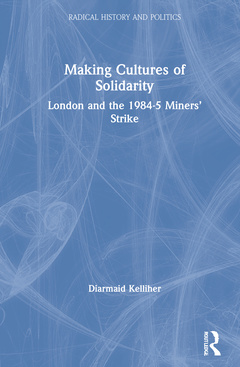Description
Making Cultures of Solidarity
London and the 1984–5 Miners’ Strike
Routledge Studies in Radical History and Politics Series
Author: Kelliher Diarmaid
Language: English
Subjects for Making Cultures of Solidarity:
Keywords
Town Hall; Miner; NUM’s Support; Strike; CPGB Member; Miners' Strike; Support Movement; 1984; NCB; 1985; Kent Miners; Solidarity; Picket Line; Thatcher; NUM Strategy; Deindustrialisation; NUM Leadership; Equality; EETPU; Sexuality; NUM President; WAPC; NUM; Kent Coalfield; Grunwick Strikers; Late Twentieth Century Britain; Gay Support; South Wales Coalfield; Jeremy Corbyn; NUM Area; Pit Closures; Dense; Swansea; UK’s Membership; Yorkshire Miner
Publication date: 05-2021
· 15.6x23.4 cm · Hardback
Publication date: 05-2021
· 15.6x23.4 cm · Paperback
Description
/li>Contents
/li>Readership
/li>Biography
/li>
This book combines radical history, critical geography, and political theory in an innovative history of the solidarity campaign in London during the 1984-5 miners? strike.
Thousands of people collected food and money, joined picket lines and demonstrations, organised meetings, travelled to mining areas, and hosted coalfield activists in their homes during the strike. The support campaign encompassed longstanding elements of the British labour movement as well as autonomously organised Black, lesbian and gay, and feminist support groups. This book shows how the solidarity of 1984-5 was rooted in the development of mutual relationships of support between the coalfields and the capital since the late 1960s. It argues that a culture of solidarity was developed through industrial and political struggles that brought together diverse activists from mining communities and London. The book also takes the story forward, exploring the aftermath of the miners? strike and the complex legacies of the support movement up to the present day. This rich history provides a compelling example of how solidarity can cross geographical and social boundaries.
This book is essential reading for students, scholars, and activists with an interest in left-wing politics and history.
Introduction 1. Conceptualising Cultures of Solidarity 2. ‘We’ve always stood with anybody who wanted to fight’: Mutual Solidarity in the Long 1970s 3. ‘We’re all in Thatcher’s sinking ship’: Class and Deindustrialisation 4. ‘Like little soviets’: Infrastructures of Solidarity 5. ‘What it meant to us about equality’: Gender, Race and Solidarity 6. Sexuality and Solidarity: Lesbians and Gays Support the Miners 7. ‘Someone else’s dubious battle’: The Limits of Solidarity 8. ‘The world doesn’t end’: After the Miners’ Strike Conclusion
Diarmaid Kelliher is a Lecturer in Human Geography in the School of Geographical & Earth Sciences at the University of Glasgow, UK.




